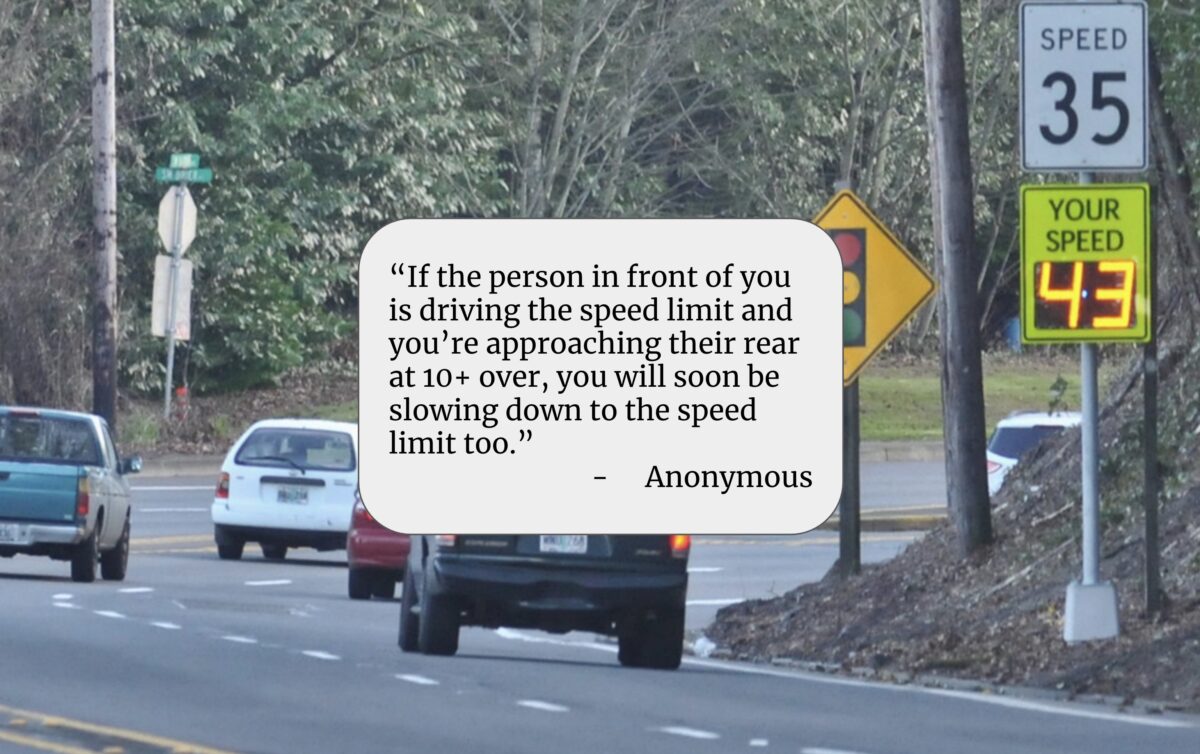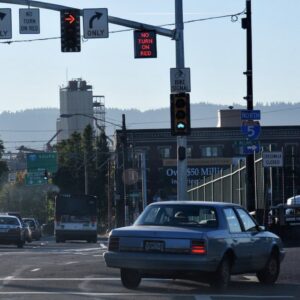Welcome to the Comment of the Week, where we highlight good comments in order to inspire more of them. You can help us choose our next one by replying with “comment of the week” to any comment you think deserves recognition. Please note: These selections are not endorsements.
In response to our article last week on the Portland Bureau of Transportation’s new authority to set speed limits within the city of Portland, readers commented with another strong round of our informed engineering vs. enforcement vs. speed-setting debate.
But rather than limiting ourselves to an ongoing abstract discussion about how other people are going to react, gosh, you, dear BikePortland reader, can set an example. Just follow the speed limit. Our numbers are greater than you might think. As Jonathan noted in a recent subscriber newsletter, our contents reach hundreds of thousands of people a month. If everyone who reads this committed to driving the speed limit, we could save lives. Heck, maybe we could get slower speeds to become a trend.
An anonymous commenter did a nice job making that point, while also summarizing their position on the speed limit debate in general, in this information-filled Comment of the Week:
Speed Limits help some drivers make informed choices. When I see a 20 is plenty sign, I slow down to 20, even if I’m riding my bicycle. Signs work. They are not 100% complied with but that’s ok. If the person in front of you is driving the speed limit and you’re approaching their rear at 10+ over, you will soon be slowing down to the speed limit too.
Enforcement is also important. People who speed must be cited and fined, your income level may deserve a break, but you get enough points and your privilege to drive gets revoked. The speed limit should be photo enforced, not PPB enforced until they earn back community trust.
Other cities in other states set their own speed limits with approval by their city council. ODOT setting speed limits is sophomoric, we don’t need a state agency telling us how to run our city, let alone our streets. The sooner all orphan highways are out of ODOT’s control, the better. ODOT cares more about efficiency and convenience rather than safety and the lives of people walking and riding bicycles.
Thank you Anonymous for the timely reminder to behave responsibly. Anonymous’s comment, and the full thread can be found under the original post. Happy holidays, and wishing everyone all the best for the New Year!







Thanks for reading.
BikePortland has served this community with independent community journalism since 2005. We rely on subscriptions from readers like you to survive. Your financial support is vital in keeping this valuable resource alive and well.
Please subscribe today to strengthen and expand our work.
Seems low to me.
oh it’s certainly low. Note that it’s the “admitted” number. The true number is much much higher! I’m actually shocked this many people even admit doing it tbh.
Its so bad out there that I’ve seen cops not even follow basic traffic laws.
I have been driving around the greater metro area a lot the past week. It is amazing to me, as someone who rarely travels on a street outside of Portland, how high the speed limits are set. I constantly found myself speeding up to meet the posted limit. I kept thinking “why are we going 35 on a windy road with driveways?” I like our chill speed limits.
Slowing down to the speed limit, or – God forbid – ten MPH below the speed limit may feel virtuous, but it will incur the wrath of drivers behind you, who will then do stupid and dangerous things to avoid being “slowed down.”
I’ve been passed more times than I can count by speeding drivers on city streets where there are no passing lanes. The streets with center-turn lanes (“suicide lanes”) are the worst b/c many drivers use that lane as a passing lane. Once on SW Oleson Rd a guy driving a pick-up truck (of course!) passed me in the center-turn lane. His back wheel threw up a rock that broke my windshield and cost me a couple of hundred bucks to replace.
Even when the driver behind you merely tailgates, it feels really dangerous and uncomfortable.
So while you may FEEL morally superior when drive slowly, doing so will have some costly impacts on YOU. I’m looking forward to the new generation of cars with sensors that do not ALLOW tailgating.
Cars with built in software that physically prevents tailgating or other dangerous behavior? In America? Doesn’t seem likely.
We’d need a paradigm shift in how this country thinks about transportation. It’s not going to come about just because it’s technically feasible to build those features into cars.
It’s not clear to me whether you are recommending we NOT drive the speed limit.
I so agree with this. If every person with a Share the Road plate drove the citied speed limit…
I have been driving more since the pandemic began, initially because the gym closed and I couldn’t shower before work, now because I am concerned about the behavior of a small minority of homeless people who assault cyclists, and the inability of a small number of motorists to share the public roadway.
So, when I drive, I try to stick to the interstates as much as possible (to keep out of residential streets) and drive at the speed limit in the right most travel lane, with the aid of my vehicle’s cruise control function. By keeping right, I leave room for those who wish to go faster, however, I have occasionally had drivers behind me gesticulating that I should drive faster – I don’t: your failure to plan does not constitute an emergency on my part.
I would also note that I regularly test my speedometer using the roadside speed indicators and a speedometer app on my phone – my car’s speedometer is accurate. Motorists should also understand that if they change the tire/wheel size of their vehicle, their speedometer needs to be recalibrated.
I have learned not to care what other people think of me or my lawful driving choices.
Photo-enforcement (of speed limits, of red lights, etc.) *seems* more objective, but as some safe-streets advocates in NYC are making clear, the worst scofflaws know exactly how to avoid photo detection. https://www.nytimes.com/2022/12/17/nyregion/license-plate-vigilantes.html (Hours after sharing this article with a friend in Portland, I noticed a PRIUS parked in front of my house whose owner had obscured part of its front and rear plates. If tolling does come to the 205 and/or 5 and/or we get congestion pricing in Portland, we can probably expect more of this bad-auto-behavior.)
Hey Lois! That NYT article was quite a story, first because of the lack of enforcement, and then because I was worried for the safety of the activists.